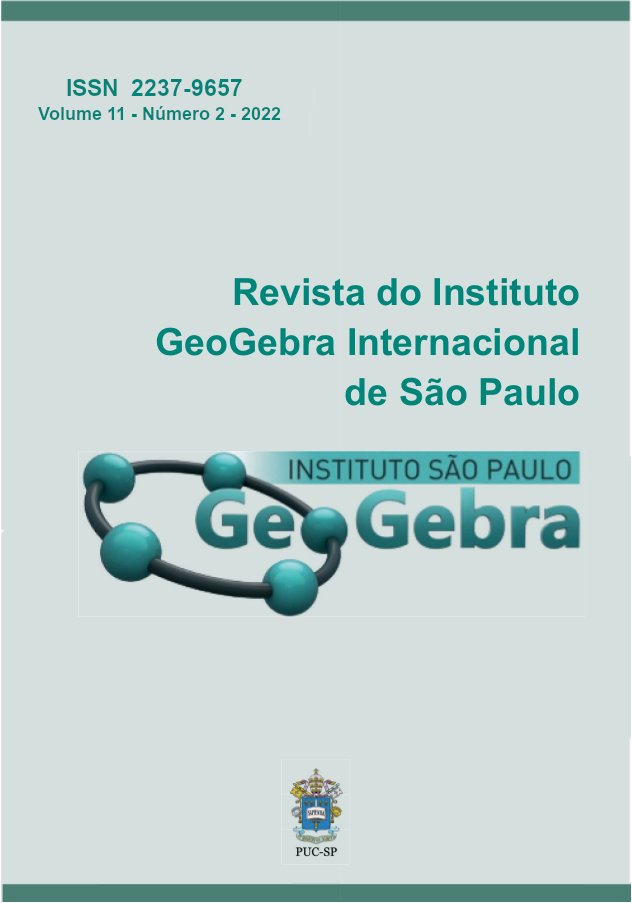Two-Variable Linear Programming in an Online Course Using GeoGebra: A Class Experience
DOI:
https://doi.org/10.23925/2237-9657.2022.v11i2p033-051Keywords:
GeoGebra, linear programming, online classAbstract
This study presents a pedagogical practice proposal that evaluates the use of GeoGebra as a cognitive tool in teaching the resolution of linear programming problems of two-variable inequalities based on the graphical method. At the beginning, a diagnostic questionnaire is proposed, then a didactic activity and finally an evaluative questionnaire. It is analyzed whether the activity promotes the exchange between the semiotic register and the graphic register in Computer Engineering students at the University of Guadalajara (UDG), considering the totally online class modality. As a result of the activity, we concluded that the students expressed greater security and interest in the use of GeoGebra, managing to graphically represent the system of inequalities.
References
Álvarez, M., Almeida, B., & Villegas, E. (2014). El proceso de enseñanza-aprendizaje de la matemática. Documentos Metodológicos. La Habana: Pueblo y Educación.
Artigue, M. (1998). Ingeniería didáctica. En Artigue, M., Douady, R., Moreno, L., Gómez, P. (Eds.). Ingeniería didáctica en educación matemática. Colombia. Una empresa docente.
Canut, M. (Julio 26-28, 2017). Aprendiendo con GeoGebra programación lineal: a través del método gráfico [Conferencia]. Tercer encuentro universitario de mejores prácticas de uso de TIC en la educación (EDUCATIC 2017), CDMX, México.
Douady, R. (1996). Ingeniería didáctica y evolución de la relación con el saber en las matemáticas de collège-seconde. En Barbin, E., Douady, R. (Eds.). Enseñanza de las matemáticas: Relación entre saberes, programas y prácticas. Francia. Topiques éditions. Publicación del I.R.E.M.
Fajardo Valencia, A. (2020). Educación tecnológica y matemática en tiempos de pandemia. Mirada del maestro , 23 , 1-4. https://doi.org/10.5212/OlharProfr.v.23.2020.15843.209209226104.0607
Hart, L. C., Smith, S. Z, Swars, S. L. & Smith, M. E. (2009). An examination of research methods in mathematics education (1995-2005). Journal of Mixed Methods Research, 3 (1), 26-41.
Mendoza, J. (2015). Utilización del software GeoGebra, como herramienta cognitiva y su incidencia en el aprendizaje de la matemática en el primer semestre de la carrera de ingeniería en industrias pecuarias, FCP, ESPOCH. (Unpublished doctoral dissertation) Instituto de Postgrado y Educación Continua de la ESPOCH.
Sánchez Pachas, C. (2020). Herramientas tecnológicas en la enseñanza de las matemáticas durante la pandemia COVID-19. Hamut´ay, 7(2), 46–57. Retrieved from http://dx.doi.org/10.21503/hamu.v7i2.2132
Zbiek, R. M., Heid, M. K., Blume, G. W., & Dick, T. P. (2007). Research on technology in mathematics education: the perspective of constructs. In F. K. Lester Jr. (Ed.), Handbook of research on mathematics teaching and learning (2nd ed.) (pp. 1169–1207). Charlotte, NC: Information Age Publishing.
Downloads
Published
How to Cite
Issue
Section
License
Copyright (c) 2022 Revista do Instituto GeoGebra Internacional de São Paulo

This work is licensed under a Creative Commons Attribution 4.0 International License.
Submission, processing, and publication of articles sent to the journal and registration of the DOI at Crossref is free of charge.
Authors retain their copyright and grant the journal the right of first publication of their article, which is simultaneously licensed under a Creative Commons - Attribution 4.0 International license CC BY that allows others to share the article by acknowledging its authorship and initial publication by the journal.
The GeoGebra journal encourages its authors to register their work with information and communication management systems aimed at researchers, such as Academia.edu, Mendeley, ResearchGate, etc.


 10.23925
10.23925
